Unit 1 Looking forwards Grammar 课件(共48张PPT) 2024-2025学年高二英语外研版(2019)选择性必修4
文档属性
| 名称 | Unit 1 Looking forwards Grammar 课件(共48张PPT) 2024-2025学年高二英语外研版(2019)选择性必修4 | 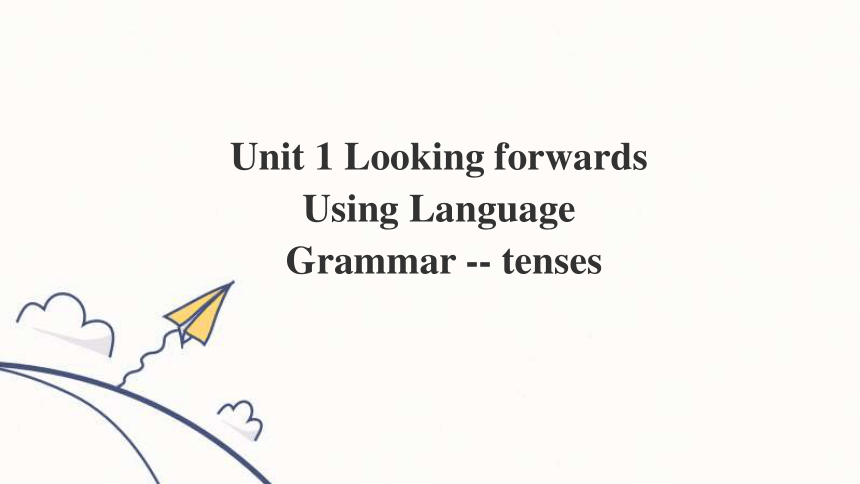 | |
| 格式 | pptx | ||
| 文件大小 | 7.3MB | ||
| 资源类型 | 教案 | ||
| 版本资源 | 外研版(2019) | ||
| 科目 | 英语 | ||
| 更新时间 | 2025-04-23 08:54:52 | ||
图片预览

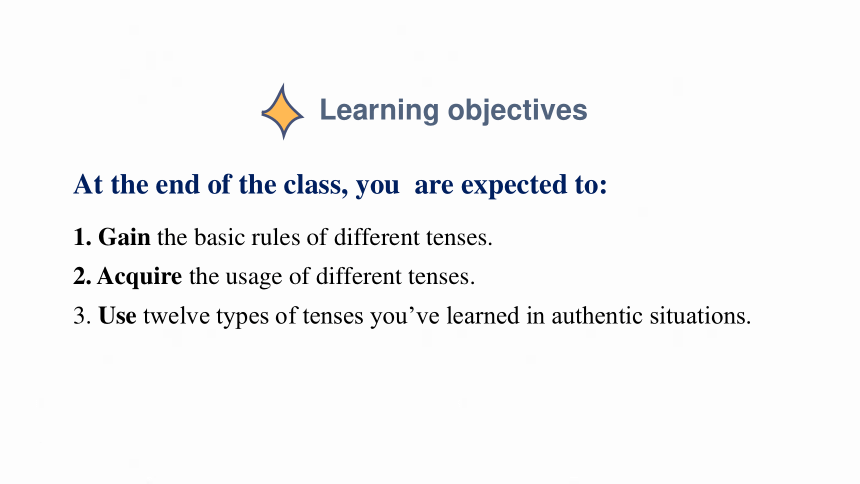
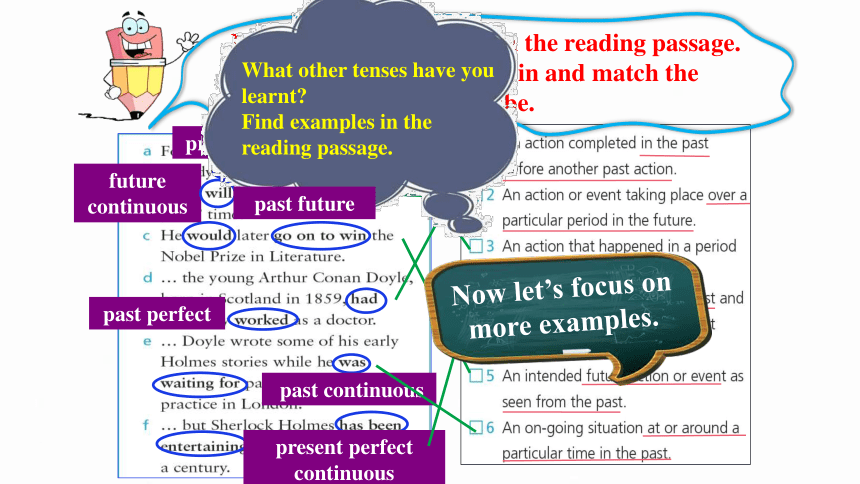
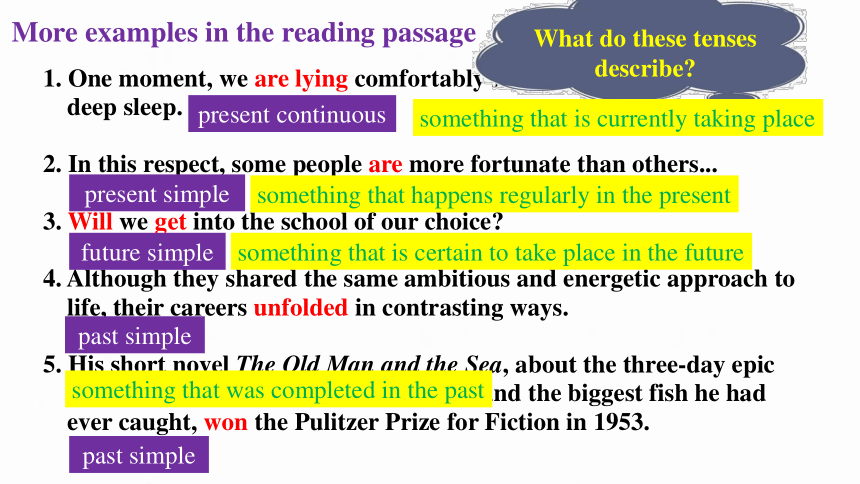
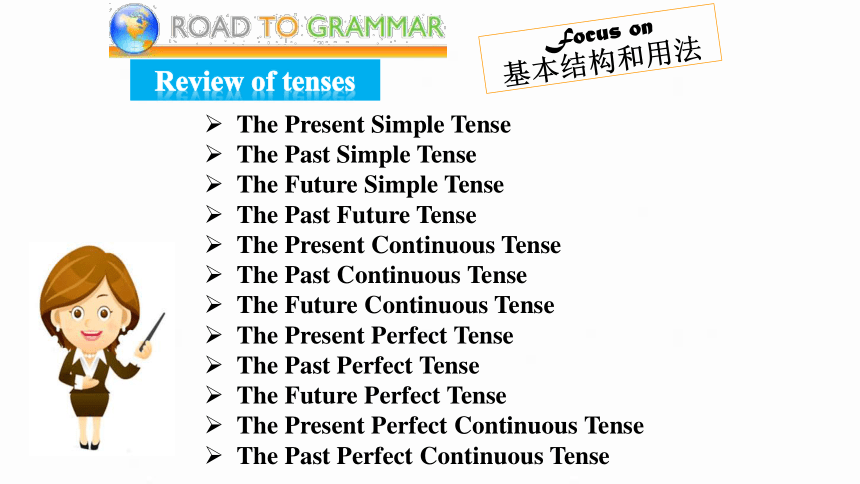
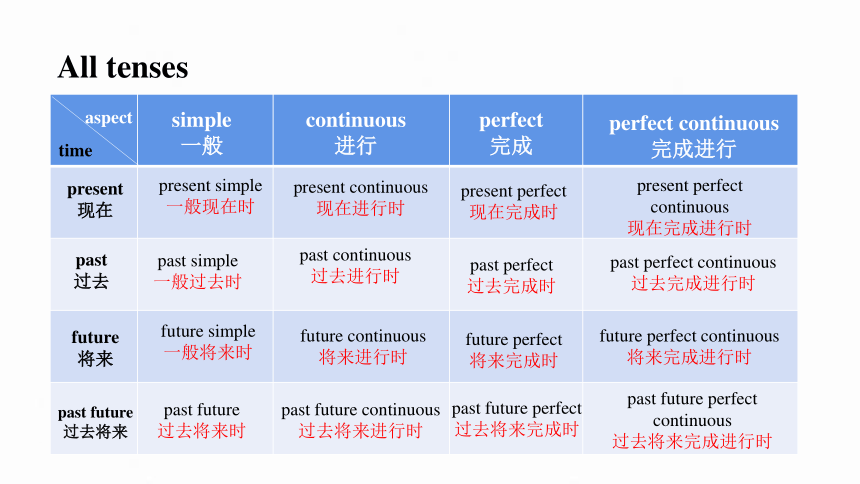
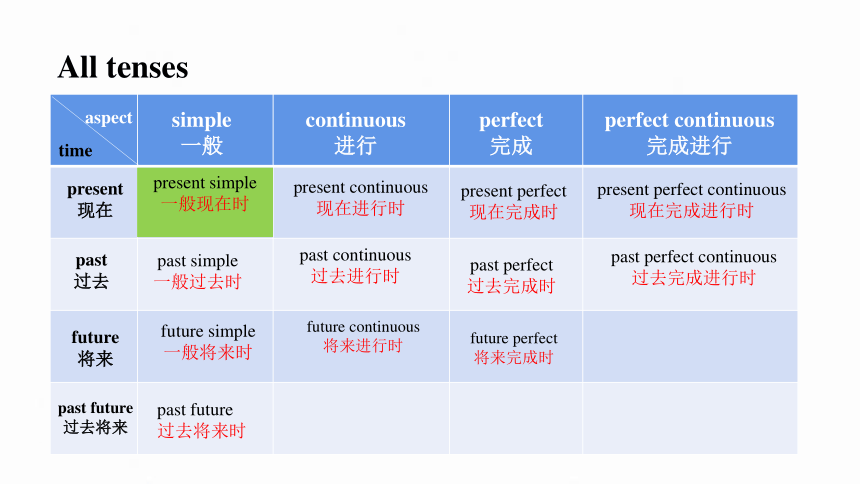
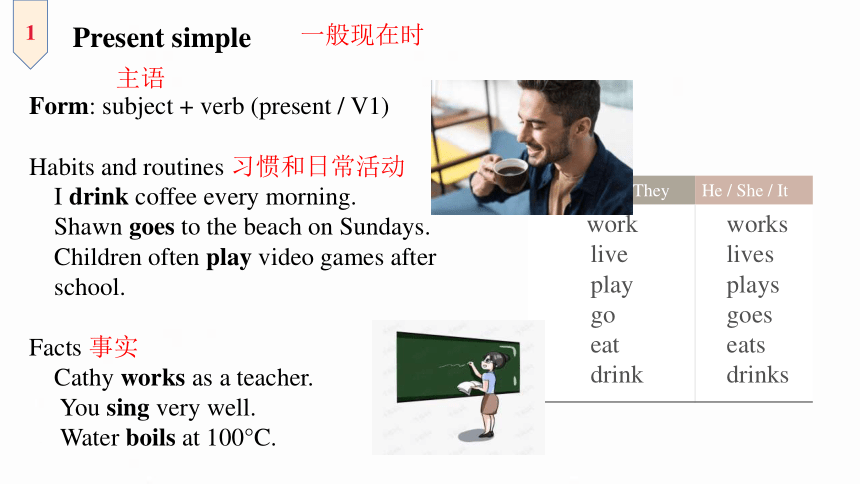
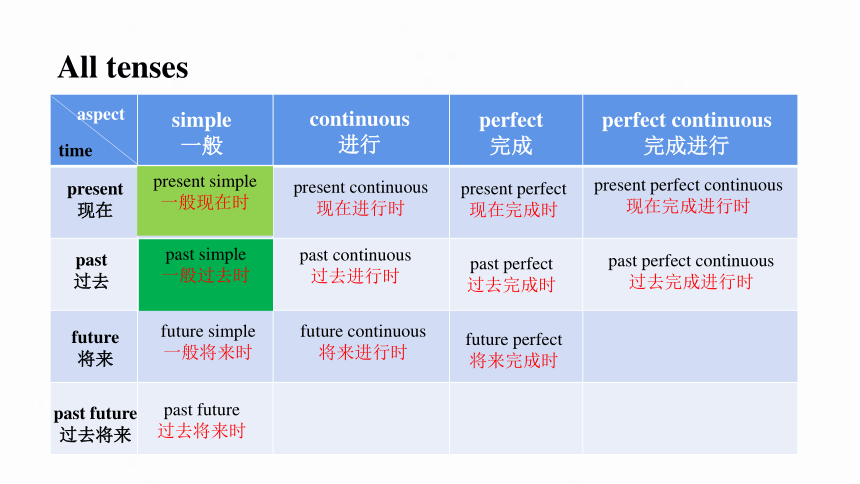
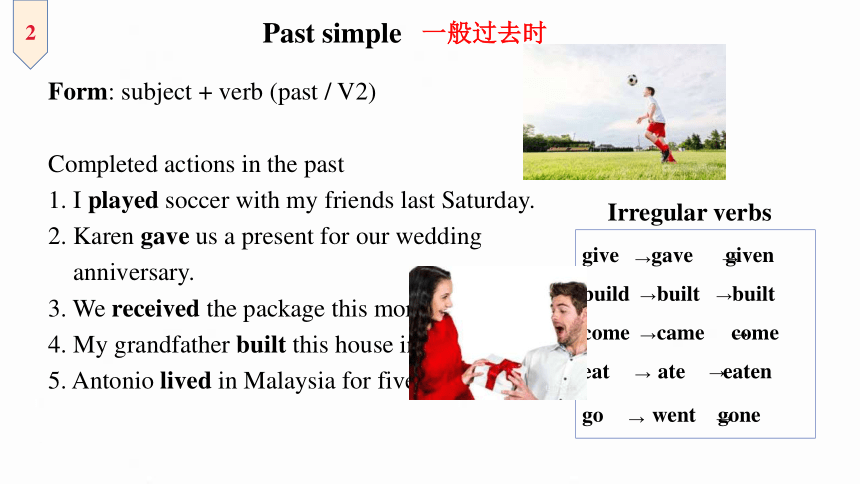
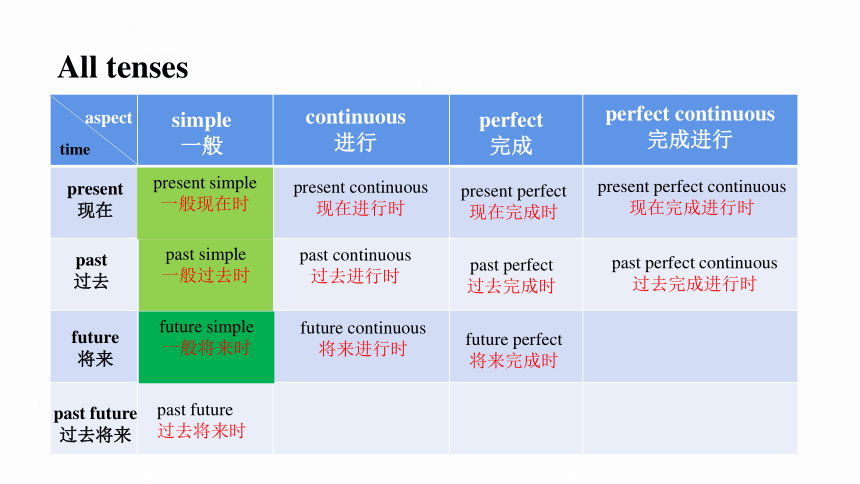
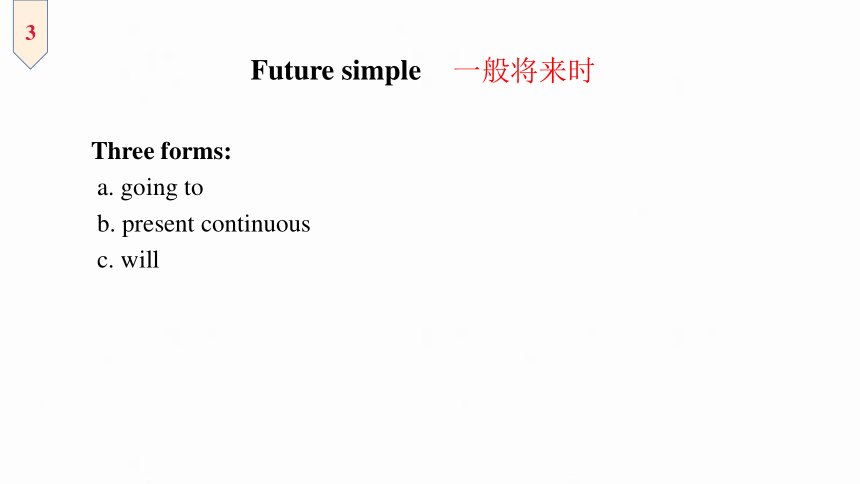
文档简介
(共48张PPT)
Unit 1 Looking forwards
Using Language
Grammar -- tenses
At the end of the class, you are expected to:
1. Gain the basic rules of different tenses.
2. Acquire the usage of different tenses.
3. Use twelve types of tenses you’ve learned in authentic situations.
Learning objectives
Look at the sentences from the reading passage. Decide which tense each is in and match the tenses to what they describe.
past continuous
future continuous
present perfect
past perfect
present perfect continuous
What other tenses have you learnt
Find examples in the
reading passage.
past future
Now let’s focus on more examples.
1. One moment, we are lying comfortably in bed, about to fall into a deep sleep.
2. In this respect, some people are more fortunate than others...
3. Will we get into the school of our choice
4. Although they shared the same ambitious and energetic approach to life, their careers unfolded in contrasting ways.
5. His short novel The Old Man and the Sea, about the three-day epic struggle between an elderly fisherman and the biggest fish he had ever caught, won the Pulitzer Prize for Fiction in 1953.
present continuous
More examples in the reading passage
present simple
future simple
past simple
past simple
What do these tenses
describe
something that is currently taking place
something that happens regularly in the present
something that is certain to take place in the future
something that was completed in the past
Focus on
基本结构和用法
Review of tenses
The Present Simple Tense
The Past Simple Tense
The Future Simple Tense
The Past Future Tense
The Present Continuous Tense
The Past Continuous Tense
The Future Continuous Tense
The Present Perfect Tense
The Past Perfect Tense
The Future Perfect Tense
The Present Perfect Continuous Tense
The Past Perfect Continuous Tense
All tenses
aspect
time
present simple
一般现在时
past simple
一般过去时
future simple
一般将来时
past future
过去将来时
simple
一般
continuous
进行
perfect
完成
perfect continuous
完成进行
present
现在
past
过去
future
将来
past future
过去将来
present continuous
现在进行时
past continuous
过去进行时
future continuous
将来进行时
past future continuous
过去将来进行时
present perfect
现在完成时
past perfect
过去完成时
future perfect
将来完成时
past future perfect
过去将来完成时
present perfect continuous
现在完成进行时
past perfect continuous
过去完成进行时
future perfect continuous
将来完成进行时
past future perfect
continuous
过去将来完成进行时
All tenses
aspect
time
present simple
一般现在时
past simple
一般过去时
future simple
一般将来时
past future
过去将来时
simple
一般
continuous
进行
perfect
完成
perfect continuous
完成进行
present
现在
past
过去
future
将来
past future
过去将来
present continuous
现在进行时
past continuous
过去进行时
future continuous
将来进行时
present perfect
现在完成时
past perfect
过去完成时
future perfect
将来完成时
present perfect continuous
现在完成进行时
past perfect continuous
过去完成进行时
Present simple
一般现在时
Form: subject + verb (present / V1)
Habits and routines 习惯和日常活动
I drink coffee every morning.
Shawn goes to the beach on Sundays.
Children often play video games after
school.
Facts 事实
Cathy works as a teacher.
You sing very well.
Water boils at 100°C.
主语
I / You / We / They He / She / It
work live play go eat drink works
lives
plays
goes
eats
drinks
1
All tenses
aspect
time
present simple
一般现在时
past simple
一般过去时
future simple
一般将来时
past future
过去将来时
simple
一般
continuous
进行
perfect
完成
perfect continuous
完成进行
present
现在
past
过去
future
将来
past future
过去将来
present continuous
现在进行时
past continuous过去进行时
future continuous
将来进行时
present perfect
现在完成时
past perfect
过去完成时
future perfect
将来完成时
present perfect continuous
现在完成进行时
past perfect continuous
过去完成进行时
Past simple
一般过去时
2
Form: subject + verb (past / V2)
Completed actions in the past
1. I played soccer with my friends last Saturday.
2. Karen gave us a present for our wedding
anniversary.
3. We received the package this morning.
4. My grandfather built this house in 1968.
5. Antonio lived in Malaysia for five years.
Irregular verbs
give gave given
build built built
come came come
eat ate eaten
go went gone
→
→
→
→
→
→
→
→
→
→
All tenses
aspect
time
present simple
一般现在时
past simple
一般过去时
future simple
一般将来时
past future
过去将来时
simple
一般
continuous
进行
perfect
完成
perfect continuous
完成进行
present
现在
past
过去
future
将来
past future
过去将来
present continuous现在进行时
past continuous
过去进行时
future continuous
将来进行时
present perfect
现在完成时
past perfect
过去完成时
future perfect
将来完成时
present perfect continuous
现在完成进行时
past perfect continuous
过去完成进行时
Future simple
一般将来时
3
Three forms:
a. going to
b. present continuous
c. will
Future simple
3
a. Going to → plans and intentions
Form: subject + am / is / are going to + verb (base)
1. We are going to buy a car.
2. I am going to start exercising regularly.
3. Bob is going to take a vacation from work.
Future simple
3
b. Present continuous → fixed arrangement
Form: subject + am / is / are + verb (-ing)
1. I am having lunch with my parents on Saturday.
2. We are flying to Mumbai the day after tomorrow.
3. Josh is giving a presentation to the board of directors on the 10th.
Future simple
3
Going to vs. present continuous
1. I am going to see the dentist sometime next week. (plan)
I am seeing the dentist tomorrow afternoon. (arrangement)
2. We are going to get married this year. (plan)
We are getting married on April 21st. (arrangement)
Future simple
3
c. Will → instant decisions, offers, promises
Form: subject + will + verb (base)
1. “May I take your order ”
“Yes, I will have the burger and fries combo, please.”
(instant decision)
2. “The phone is ringing.”
“I will get it.” (instant decision)
3. “These files are really heavy.”
“I will help you with them.” (offer)
4. It’s hard to get a cab at this hour. I will give you a ride home. (offer)
Future simple
3
c. Will → instant decisions, offers, promises
Form: subject + will + verb (base)
5. Can you lend me $200 I will pay you back next week.
6. Thank you for your email. We will respond within two business days.
Future simple
3
Making predictions: will & going to
will → predictions based on knowledge/ personal experience
1. I think Spain will win the World Cup.
2. You should watch Interstellar. I’m sure you will love it.
Going to → predictions based on something in the present
3. Look at the sky. It is going to rain soon.
4. Mom is going to be really happy when she sees my grades.
All tenses
aspect
time
present simple
一般现在时
past simple
一般过去时
future simple
一般将来时
past future
过去将来时
simple
一般
continuous
进行
perfect
完成
perfect continuous完成进行
present
现在
past
过去
future
将来
past future
过去将来
present continuous现在进行时
past continuous过去进行时
future continuous
将来进行时
present perfect
现在完成时
past perfect
过去完成时
future perfect
将来完成时
present perfect continuous
现在完成进行时
past perfect continuous
过去完成进行时
4
Past Future
1. He said he would go to the cinema tonight.
2. I said I should learn French this year.
3. No one knew when he was going to come.
4. She said she was going to start off at once.
5. He said the train was leaving at six the next morning.
6. She told me she was coming to see me.
Form: subject + was/were going to + verb (base)
subject + would +verb (base)
subject + was/were + verb (-ing)
过去将来时
All tenses
aspect
time
present simple
一般现在时
past simple
一般过去时
future simple
一般将来时
past future
过去将来时
simple
一般
continuous
进行
perfect
完成
perfect continuous
完成进行
present
现在
past
过去
future
将来
past future
过去将来
present continuous
现在进行时
past continuous
过去进行时
future continuous
将来进行时
present perfect
现在完成时
past perfect
过去完成时
future perfect
将来完成时
present perfect continuous
现在完成进行时
past perfect continuous
过去完成进行时
Present continuous
Form: subject + am/is/are + verb (-ing)
I am
He / She / It is
You / We / They are
Actions happening now ( at the time of speaking )
1. I am drinking coffee right now.
2. We are having breakfast.
3. It is raining outside.
5
现在进行时
现在正在发生的动作
Present continuous
Form: subject + am/is/are + verb (-ing)
I am
He / She / It is
You / We / They are
Temporary activities
4. Arun is learning to play the guitar.
5. I am watching a really interesting TV series at the moment.
6. My sister is staying with us for a couple of weeks.
5
暂时性的活动
Form: subject + am/is/are + verb (-ing)
I am
He / She / It is
You / We / They are
Changes taking place now
7. English lessons on YouTube are becoming very popular these days.
8. The price of crude oil is falling rapidly.
9. Scientists say that the Earth is getting warmer.
5
现在发生的改变
Present continuous
All tenses
aspect
time
present simple
一般现在时
past simple
一般过去时
future simple
一般将来时
past future
过去将来时
simple
一般
continuous
进行
perfect
完成
perfect continuous
完成进行
present
现在
past
过去
future
将来
past future
过去将来
present continuous
现在进行时
past continuous
过去进行时
future continuous
将来进行时
present perfect
现在完成时
past perfect
过去完成时
future perfect
将来完成时
present perfect continuous
现在完成进行时
past perfect continuous
过去完成进行时
Past continuous
过去进行时
1. I was having dinner with my family when the doorbell rang.
past
now
future
……
……
×
I was having dinner
doorbell rang
unfinished, ongoing action in the past (+ finished action)
6
Past continuous
过去进行时
1. I was having dinner with my family when the doorbell rang.
2. It was raining when Priya left for work.
3. The power went out while the children were studying.
4. While we were waiting at the bus stop, we saw a car accident.
past
now
future
……
……
×
It was raining
Priya left for
work
unfinished, ongoing action in the past (+ finished action)
Form: subject + was/were + verb (-ing)
I / He / She / It was
You / We / They were
Children were
studying
power went out
we were waiting
saw a car accident
6
All tenses
aspect
time
present simple
一般现在时
past simple
一般过去时
future simple
一般将来时
past future
过去将来时
simple
一般
continuous
进行
perfect
完成
perfect continuous
完成进行
present
现在
past
过去
future
将来
past future
过去将来
present continuous
现在进行时
past continuous
过去进行时
future continuous
将来进行时
present perfect
现在完成时
past perfect
过去完成时
future perfect
将来完成时
present perfect continuous
现在完成进行时
past perfect continuous
过去完成进行时
7
Future continuous
Form: subject + will be + verb (-ing)
将来进行时
1. At 11 a.m. tomorrow, I will be driving to Portland.
past
now
9 a.m.
11 a.m.
……
……
Ongoing actions in the future
2. “Do you want to come with us to the movies on Saturday evening ”
“ I can’t. I will be working until late.”
future
afternoon
evening
7
Future continuous
Form: subject + will be + verb (-ing)
3. I will be staying at the Hilton hotel in Portland.
I am staying at the Hilton hotel in Portland.
I am going to stay at the Hilton hotel in Portland.
4. “I’m going to the cafeteria. Do you want me to bring you a coffee ”
“Thanks, but don’t bother. I will be going there in a little while
myself.”
“Thanks,but don’t bother. I am going there in a little while myself.”
Fixed or routine events
All tenses
aspect
time
present simple
一般现在时
past simple
一般过去时
future simple
一般将来时
past future
过去将来时
simple
一般
continuous
进行
perfect
完成
perfect continuous
完成进行
present
现在
past
过去
future
将来
past future
过去将来
present continuous
现在进行时
past continuous
过去进行时
future continuous
将来进行时
present perfect
现在完成时
past perfect
过去完成时
future perfect
将来完成时
present perfect continuous
现在完成进行时
past perfect continuous
过去完成进行时
8
Present perfect 现在完成时
Form: subject + have/has + verb (past participle/V3)
I / You / We / They have
He / She / It has
Experiences
1. I have taught English to many students.
I taught many students when I was a teacher.
2. Ashley has visited France four times.
Ashley visited France in 2015.
3. We have seen two movies this week.
We saw two movies last week.
my career
past
now
future
future
past
now
my career
Ashley’s life
2015
last week
this week
(in my career)
(in her life)
Present perfect 现在完成时
Form: subject + have/has + verb (past participle/V3)
I / You / We / They have
He / She / It has
Recent actions or events
4. I have finished my homework.
I finished my homework at 6.30 p.m.
5. Arthur has lost his glasses.
Arthur lost his glasses at the party.
6. The police have arrested a young man in connection with the robbery.
The police arrested a young man last night in connection with the
robbery.
8
past
now
future
×
?
past
now
future
×
All tenses
aspect
time
present simple
一般现在时
past simple
一般过去时
future simple
一般将来时
past future
过去将来时
simple
一般
continuous
进行
perfect
完成
perfect continuous
完成进行
present
现在
past
过去
future
将来
past future
过去将来
present continuous
现在进行时
past continuous
过去进行时
future continuous
将来进行时
present perfect
现在完成时
past perfect
过去完成时
future perfect
将来完成时
present perfect continuous
现在完成进行时
past perfect continuous
过去完成进行时
Past perfect 过去完成时
When we got to the theater, the movie started. (past simple)
9
future
past
now
×
×
When we got to the theater, the movie had started. (past perfect)
future
past
now
×
×
Form: subject + had + verb (past participle / V3)
The first past action (when there are two or more actions)
1. When we got to the theater, the movie had started.
2. I was sick because I had eaten too much the previous night.
3. The girl looked very familiar. I had seen her somewhere before.
Past perfect 过去完成时
9
Form: subject + had + verb (past participle / V3)
The first past action (when there are two or more actions)
future
past
now
×
×
All tenses
aspect
time
present simple
一般现在时
past simple
一般过去时
future simple
一般将来时
past future
过去将来时
simple
一般
continuous
进行
perfect
完成
perfect continuous
完成进行
present
现在
past
过去
future
将来
past future
过去将来
present continuous
现在进行时
past continuous
过去进行时
future continuous
将来进行时
present perfect
现在完成时
past perfect
过去完成时
future perfect
将来完成时
present perfect continuous
现在完成进行时
past perfect continuous
过去完成进行时
Future perfect 将来完成时
10
1. By August, Aaron will have saved $600.
2. By 5 p.m., we will have painted the living room.
Form: subject + will have + verb (past participle / V3)
Future perfect: completed actions in the future
All tenses
aspect
time
present simple
一般现在时
past simple
一般过去时
future simple
一般将来时
past future
过去将来时
simple
一般
continuous
进行
perfect
完成
perfect continuous
完成进行
present
现在
past
过去
future
将来
past future
过去将来
present continuous
现在进行时
past continuous
过去进行时
future continuous
将来进行时
present perfect
现在完成时
past perfect
过去完成时
future perfect
将来完成时
present perfect continuous
现在完成进行时
past perfect continuous
过去完成进行时
Present perfect continuous 现在完成进行时
11
Form: subject + have/has been + verb (-ing)
Actions that started in the past and are still continuing
1. I have been waiting to see the doctor for two hours.
2. He has been playing tennis since he was a child / for 20 years.
3. She has been learning English for eight months/since last October.
4. It has been raining all morning/since 4 a.m.
future
past
now
……
……
5 p.m.
2 hrs
still waiting...
/ since 5 p.m.
1. I have been waiting to see the doctor for two hours.
I am waiting to see the doctor for two hours.
2. He has been playing tennis since he was a child / for 20 years.
He is playing tennis since he was a child.
Present perfect continuous 现在完成进行时
Form: subject + have/has been + verb (-ing)
All tenses
aspect
time
present simple
一般现在时
past simple
一般过去时
future simple
一般将来时
past future
过去将来时
simple
一般
continuous
进行
perfect
完成
perfect continuous
完成进行
present
现在
past
过去
future
将来
past future
过去将来
present continuous
现在进行时
past continuous
过去进行时
future continuous
将来进行时
present perfect
现在完成时
past perfect
过去完成时
future perfect
将来完成时
present perfect continuous
现在完成进行时
past perfect continuous
过去完成进行时
12
Past perfect continuous 过去完成进行时
Form: subject + had been + verb (-ing)
The first (continuous) past action
1. I felt really tired because I had been driving all day.
past
now
future
felt tired
……
……
had been driving
12
Form: subject + had been + verb (-ing)
The first (continuous) past action
1. I felt really tired because I had been driving all day.
2. She had been waiting for two hours when the doctor finally arrived.
3. The ground was wet because it had been raining.
4. When he quit his job at the factory, he had been working there for 12
years.
Past perfect continuous 过去完成进行时
local people who are happy to share their lives with us.
I 5. _______ (feel) happy and free of worries. And, of course, I 6. ____________________ (become) fitter. This gap year has been a fantastic opportunity for my personal growth, and I surely 7. _____________ (continue) to learn about how other people live their lives after it ends.
Complete the blog with the correct form of the verbs in brackets. (Ex2; P5)
I woke at dawn again and already the birds 1. ____________ (sing). In the coming days, we 2. ______________ (pain) the toilet block that we had been building over the last two months.
I 3.___________________________ (live) in this Cambodian village for two months. Despite the hard physical work, I 4. _____________________________ (not regret) for one moment choosing to spend my gap year as a volunteer for the Cambodia Foundation. It is wonderful to meet such friendly
were singing
would be painting
have been living/have lived
don’t regret/haven’t regretted
feel
am becoming/have become
will continue
Read the profile and talk about David’s life using different tenses where appropriate. (Ex3; P5)
PERSONAL INFORMATION
Date of Birth 20 June 2001
Nationality British
EDUCATION
2007-2013 Carson Primary School
2013-2019 Wildwood High School
EXTRACURRICULAR EXPERIENCE
Sept 2017 first prize for school science project
Apr-Oct 2018 exchange programme in China
Jul 2019-present gap year in Cambodia
FUTURE PLANS
undergraduate study at Newcastle University
chemical engineer after graduation
voluntary work to help people in need
David Mason
Talk about David's life
David was born on 20th June, 2001 in Britain. He studied in Carson Primary School from 2007 to 2013 and in Wildwood High School from 2013 to 2019. He is an excellent person and has his personal experience. For example, he won the first prize for school science project in September 2017. And he participated in an exchange programme in China from April to October in 2018. He chose to spend his gap year in Cambodia in July 2019 and has been there up to now.
He has already made his future plans. He will continue his undergraduate study at Newcastle University. After graduation, he will work as a chemical engineer and do some voluntary work to help people in need.
Interview your parents about their past experience and future plans.Write a report using different tenses where appropriate.
Homework
Unit 1 Looking forwards
Using Language
Grammar -- tenses
At the end of the class, you are expected to:
1. Gain the basic rules of different tenses.
2. Acquire the usage of different tenses.
3. Use twelve types of tenses you’ve learned in authentic situations.
Learning objectives
Look at the sentences from the reading passage. Decide which tense each is in and match the tenses to what they describe.
past continuous
future continuous
present perfect
past perfect
present perfect continuous
What other tenses have you learnt
Find examples in the
reading passage.
past future
Now let’s focus on more examples.
1. One moment, we are lying comfortably in bed, about to fall into a deep sleep.
2. In this respect, some people are more fortunate than others...
3. Will we get into the school of our choice
4. Although they shared the same ambitious and energetic approach to life, their careers unfolded in contrasting ways.
5. His short novel The Old Man and the Sea, about the three-day epic struggle between an elderly fisherman and the biggest fish he had ever caught, won the Pulitzer Prize for Fiction in 1953.
present continuous
More examples in the reading passage
present simple
future simple
past simple
past simple
What do these tenses
describe
something that is currently taking place
something that happens regularly in the present
something that is certain to take place in the future
something that was completed in the past
Focus on
基本结构和用法
Review of tenses
The Present Simple Tense
The Past Simple Tense
The Future Simple Tense
The Past Future Tense
The Present Continuous Tense
The Past Continuous Tense
The Future Continuous Tense
The Present Perfect Tense
The Past Perfect Tense
The Future Perfect Tense
The Present Perfect Continuous Tense
The Past Perfect Continuous Tense
All tenses
aspect
time
present simple
一般现在时
past simple
一般过去时
future simple
一般将来时
past future
过去将来时
simple
一般
continuous
进行
perfect
完成
perfect continuous
完成进行
present
现在
past
过去
future
将来
past future
过去将来
present continuous
现在进行时
past continuous
过去进行时
future continuous
将来进行时
past future continuous
过去将来进行时
present perfect
现在完成时
past perfect
过去完成时
future perfect
将来完成时
past future perfect
过去将来完成时
present perfect continuous
现在完成进行时
past perfect continuous
过去完成进行时
future perfect continuous
将来完成进行时
past future perfect
continuous
过去将来完成进行时
All tenses
aspect
time
present simple
一般现在时
past simple
一般过去时
future simple
一般将来时
past future
过去将来时
simple
一般
continuous
进行
perfect
完成
perfect continuous
完成进行
present
现在
past
过去
future
将来
past future
过去将来
present continuous
现在进行时
past continuous
过去进行时
future continuous
将来进行时
present perfect
现在完成时
past perfect
过去完成时
future perfect
将来完成时
present perfect continuous
现在完成进行时
past perfect continuous
过去完成进行时
Present simple
一般现在时
Form: subject + verb (present / V1)
Habits and routines 习惯和日常活动
I drink coffee every morning.
Shawn goes to the beach on Sundays.
Children often play video games after
school.
Facts 事实
Cathy works as a teacher.
You sing very well.
Water boils at 100°C.
主语
I / You / We / They He / She / It
work live play go eat drink works
lives
plays
goes
eats
drinks
1
All tenses
aspect
time
present simple
一般现在时
past simple
一般过去时
future simple
一般将来时
past future
过去将来时
simple
一般
continuous
进行
perfect
完成
perfect continuous
完成进行
present
现在
past
过去
future
将来
past future
过去将来
present continuous
现在进行时
past continuous过去进行时
future continuous
将来进行时
present perfect
现在完成时
past perfect
过去完成时
future perfect
将来完成时
present perfect continuous
现在完成进行时
past perfect continuous
过去完成进行时
Past simple
一般过去时
2
Form: subject + verb (past / V2)
Completed actions in the past
1. I played soccer with my friends last Saturday.
2. Karen gave us a present for our wedding
anniversary.
3. We received the package this morning.
4. My grandfather built this house in 1968.
5. Antonio lived in Malaysia for five years.
Irregular verbs
give gave given
build built built
come came come
eat ate eaten
go went gone
→
→
→
→
→
→
→
→
→
→
All tenses
aspect
time
present simple
一般现在时
past simple
一般过去时
future simple
一般将来时
past future
过去将来时
simple
一般
continuous
进行
perfect
完成
perfect continuous
完成进行
present
现在
past
过去
future
将来
past future
过去将来
present continuous现在进行时
past continuous
过去进行时
future continuous
将来进行时
present perfect
现在完成时
past perfect
过去完成时
future perfect
将来完成时
present perfect continuous
现在完成进行时
past perfect continuous
过去完成进行时
Future simple
一般将来时
3
Three forms:
a. going to
b. present continuous
c. will
Future simple
3
a. Going to → plans and intentions
Form: subject + am / is / are going to + verb (base)
1. We are going to buy a car.
2. I am going to start exercising regularly.
3. Bob is going to take a vacation from work.
Future simple
3
b. Present continuous → fixed arrangement
Form: subject + am / is / are + verb (-ing)
1. I am having lunch with my parents on Saturday.
2. We are flying to Mumbai the day after tomorrow.
3. Josh is giving a presentation to the board of directors on the 10th.
Future simple
3
Going to vs. present continuous
1. I am going to see the dentist sometime next week. (plan)
I am seeing the dentist tomorrow afternoon. (arrangement)
2. We are going to get married this year. (plan)
We are getting married on April 21st. (arrangement)
Future simple
3
c. Will → instant decisions, offers, promises
Form: subject + will + verb (base)
1. “May I take your order ”
“Yes, I will have the burger and fries combo, please.”
(instant decision)
2. “The phone is ringing.”
“I will get it.” (instant decision)
3. “These files are really heavy.”
“I will help you with them.” (offer)
4. It’s hard to get a cab at this hour. I will give you a ride home. (offer)
Future simple
3
c. Will → instant decisions, offers, promises
Form: subject + will + verb (base)
5. Can you lend me $200 I will pay you back next week.
6. Thank you for your email. We will respond within two business days.
Future simple
3
Making predictions: will & going to
will → predictions based on knowledge/ personal experience
1. I think Spain will win the World Cup.
2. You should watch Interstellar. I’m sure you will love it.
Going to → predictions based on something in the present
3. Look at the sky. It is going to rain soon.
4. Mom is going to be really happy when she sees my grades.
All tenses
aspect
time
present simple
一般现在时
past simple
一般过去时
future simple
一般将来时
past future
过去将来时
simple
一般
continuous
进行
perfect
完成
perfect continuous完成进行
present
现在
past
过去
future
将来
past future
过去将来
present continuous现在进行时
past continuous过去进行时
future continuous
将来进行时
present perfect
现在完成时
past perfect
过去完成时
future perfect
将来完成时
present perfect continuous
现在完成进行时
past perfect continuous
过去完成进行时
4
Past Future
1. He said he would go to the cinema tonight.
2. I said I should learn French this year.
3. No one knew when he was going to come.
4. She said she was going to start off at once.
5. He said the train was leaving at six the next morning.
6. She told me she was coming to see me.
Form: subject + was/were going to + verb (base)
subject + would +verb (base)
subject + was/were + verb (-ing)
过去将来时
All tenses
aspect
time
present simple
一般现在时
past simple
一般过去时
future simple
一般将来时
past future
过去将来时
simple
一般
continuous
进行
perfect
完成
perfect continuous
完成进行
present
现在
past
过去
future
将来
past future
过去将来
present continuous
现在进行时
past continuous
过去进行时
future continuous
将来进行时
present perfect
现在完成时
past perfect
过去完成时
future perfect
将来完成时
present perfect continuous
现在完成进行时
past perfect continuous
过去完成进行时
Present continuous
Form: subject + am/is/are + verb (-ing)
I am
He / She / It is
You / We / They are
Actions happening now ( at the time of speaking )
1. I am drinking coffee right now.
2. We are having breakfast.
3. It is raining outside.
5
现在进行时
现在正在发生的动作
Present continuous
Form: subject + am/is/are + verb (-ing)
I am
He / She / It is
You / We / They are
Temporary activities
4. Arun is learning to play the guitar.
5. I am watching a really interesting TV series at the moment.
6. My sister is staying with us for a couple of weeks.
5
暂时性的活动
Form: subject + am/is/are + verb (-ing)
I am
He / She / It is
You / We / They are
Changes taking place now
7. English lessons on YouTube are becoming very popular these days.
8. The price of crude oil is falling rapidly.
9. Scientists say that the Earth is getting warmer.
5
现在发生的改变
Present continuous
All tenses
aspect
time
present simple
一般现在时
past simple
一般过去时
future simple
一般将来时
past future
过去将来时
simple
一般
continuous
进行
perfect
完成
perfect continuous
完成进行
present
现在
past
过去
future
将来
past future
过去将来
present continuous
现在进行时
past continuous
过去进行时
future continuous
将来进行时
present perfect
现在完成时
past perfect
过去完成时
future perfect
将来完成时
present perfect continuous
现在完成进行时
past perfect continuous
过去完成进行时
Past continuous
过去进行时
1. I was having dinner with my family when the doorbell rang.
past
now
future
……
……
×
I was having dinner
doorbell rang
unfinished, ongoing action in the past (+ finished action)
6
Past continuous
过去进行时
1. I was having dinner with my family when the doorbell rang.
2. It was raining when Priya left for work.
3. The power went out while the children were studying.
4. While we were waiting at the bus stop, we saw a car accident.
past
now
future
……
……
×
It was raining
Priya left for
work
unfinished, ongoing action in the past (+ finished action)
Form: subject + was/were + verb (-ing)
I / He / She / It was
You / We / They were
Children were
studying
power went out
we were waiting
saw a car accident
6
All tenses
aspect
time
present simple
一般现在时
past simple
一般过去时
future simple
一般将来时
past future
过去将来时
simple
一般
continuous
进行
perfect
完成
perfect continuous
完成进行
present
现在
past
过去
future
将来
past future
过去将来
present continuous
现在进行时
past continuous
过去进行时
future continuous
将来进行时
present perfect
现在完成时
past perfect
过去完成时
future perfect
将来完成时
present perfect continuous
现在完成进行时
past perfect continuous
过去完成进行时
7
Future continuous
Form: subject + will be + verb (-ing)
将来进行时
1. At 11 a.m. tomorrow, I will be driving to Portland.
past
now
9 a.m.
11 a.m.
……
……
Ongoing actions in the future
2. “Do you want to come with us to the movies on Saturday evening ”
“ I can’t. I will be working until late.”
future
afternoon
evening
7
Future continuous
Form: subject + will be + verb (-ing)
3. I will be staying at the Hilton hotel in Portland.
I am staying at the Hilton hotel in Portland.
I am going to stay at the Hilton hotel in Portland.
4. “I’m going to the cafeteria. Do you want me to bring you a coffee ”
“Thanks, but don’t bother. I will be going there in a little while
myself.”
“Thanks,but don’t bother. I am going there in a little while myself.”
Fixed or routine events
All tenses
aspect
time
present simple
一般现在时
past simple
一般过去时
future simple
一般将来时
past future
过去将来时
simple
一般
continuous
进行
perfect
完成
perfect continuous
完成进行
present
现在
past
过去
future
将来
past future
过去将来
present continuous
现在进行时
past continuous
过去进行时
future continuous
将来进行时
present perfect
现在完成时
past perfect
过去完成时
future perfect
将来完成时
present perfect continuous
现在完成进行时
past perfect continuous
过去完成进行时
8
Present perfect 现在完成时
Form: subject + have/has + verb (past participle/V3)
I / You / We / They have
He / She / It has
Experiences
1. I have taught English to many students.
I taught many students when I was a teacher.
2. Ashley has visited France four times.
Ashley visited France in 2015.
3. We have seen two movies this week.
We saw two movies last week.
my career
past
now
future
future
past
now
my career
Ashley’s life
2015
last week
this week
(in my career)
(in her life)
Present perfect 现在完成时
Form: subject + have/has + verb (past participle/V3)
I / You / We / They have
He / She / It has
Recent actions or events
4. I have finished my homework.
I finished my homework at 6.30 p.m.
5. Arthur has lost his glasses.
Arthur lost his glasses at the party.
6. The police have arrested a young man in connection with the robbery.
The police arrested a young man last night in connection with the
robbery.
8
past
now
future
×
?
past
now
future
×
All tenses
aspect
time
present simple
一般现在时
past simple
一般过去时
future simple
一般将来时
past future
过去将来时
simple
一般
continuous
进行
perfect
完成
perfect continuous
完成进行
present
现在
past
过去
future
将来
past future
过去将来
present continuous
现在进行时
past continuous
过去进行时
future continuous
将来进行时
present perfect
现在完成时
past perfect
过去完成时
future perfect
将来完成时
present perfect continuous
现在完成进行时
past perfect continuous
过去完成进行时
Past perfect 过去完成时
When we got to the theater, the movie started. (past simple)
9
future
past
now
×
×
When we got to the theater, the movie had started. (past perfect)
future
past
now
×
×
Form: subject + had + verb (past participle / V3)
The first past action (when there are two or more actions)
1. When we got to the theater, the movie had started.
2. I was sick because I had eaten too much the previous night.
3. The girl looked very familiar. I had seen her somewhere before.
Past perfect 过去完成时
9
Form: subject + had + verb (past participle / V3)
The first past action (when there are two or more actions)
future
past
now
×
×
All tenses
aspect
time
present simple
一般现在时
past simple
一般过去时
future simple
一般将来时
past future
过去将来时
simple
一般
continuous
进行
perfect
完成
perfect continuous
完成进行
present
现在
past
过去
future
将来
past future
过去将来
present continuous
现在进行时
past continuous
过去进行时
future continuous
将来进行时
present perfect
现在完成时
past perfect
过去完成时
future perfect
将来完成时
present perfect continuous
现在完成进行时
past perfect continuous
过去完成进行时
Future perfect 将来完成时
10
1. By August, Aaron will have saved $600.
2. By 5 p.m., we will have painted the living room.
Form: subject + will have + verb (past participle / V3)
Future perfect: completed actions in the future
All tenses
aspect
time
present simple
一般现在时
past simple
一般过去时
future simple
一般将来时
past future
过去将来时
simple
一般
continuous
进行
perfect
完成
perfect continuous
完成进行
present
现在
past
过去
future
将来
past future
过去将来
present continuous
现在进行时
past continuous
过去进行时
future continuous
将来进行时
present perfect
现在完成时
past perfect
过去完成时
future perfect
将来完成时
present perfect continuous
现在完成进行时
past perfect continuous
过去完成进行时
Present perfect continuous 现在完成进行时
11
Form: subject + have/has been + verb (-ing)
Actions that started in the past and are still continuing
1. I have been waiting to see the doctor for two hours.
2. He has been playing tennis since he was a child / for 20 years.
3. She has been learning English for eight months/since last October.
4. It has been raining all morning/since 4 a.m.
future
past
now
……
……
5 p.m.
2 hrs
still waiting...
/ since 5 p.m.
1. I have been waiting to see the doctor for two hours.
I am waiting to see the doctor for two hours.
2. He has been playing tennis since he was a child / for 20 years.
He is playing tennis since he was a child.
Present perfect continuous 现在完成进行时
Form: subject + have/has been + verb (-ing)
All tenses
aspect
time
present simple
一般现在时
past simple
一般过去时
future simple
一般将来时
past future
过去将来时
simple
一般
continuous
进行
perfect
完成
perfect continuous
完成进行
present
现在
past
过去
future
将来
past future
过去将来
present continuous
现在进行时
past continuous
过去进行时
future continuous
将来进行时
present perfect
现在完成时
past perfect
过去完成时
future perfect
将来完成时
present perfect continuous
现在完成进行时
past perfect continuous
过去完成进行时
12
Past perfect continuous 过去完成进行时
Form: subject + had been + verb (-ing)
The first (continuous) past action
1. I felt really tired because I had been driving all day.
past
now
future
felt tired
……
……
had been driving
12
Form: subject + had been + verb (-ing)
The first (continuous) past action
1. I felt really tired because I had been driving all day.
2. She had been waiting for two hours when the doctor finally arrived.
3. The ground was wet because it had been raining.
4. When he quit his job at the factory, he had been working there for 12
years.
Past perfect continuous 过去完成进行时
local people who are happy to share their lives with us.
I 5. _______ (feel) happy and free of worries. And, of course, I 6. ____________________ (become) fitter. This gap year has been a fantastic opportunity for my personal growth, and I surely 7. _____________ (continue) to learn about how other people live their lives after it ends.
Complete the blog with the correct form of the verbs in brackets. (Ex2; P5)
I woke at dawn again and already the birds 1. ____________ (sing). In the coming days, we 2. ______________ (pain) the toilet block that we had been building over the last two months.
I 3.___________________________ (live) in this Cambodian village for two months. Despite the hard physical work, I 4. _____________________________ (not regret) for one moment choosing to spend my gap year as a volunteer for the Cambodia Foundation. It is wonderful to meet such friendly
were singing
would be painting
have been living/have lived
don’t regret/haven’t regretted
feel
am becoming/have become
will continue
Read the profile and talk about David’s life using different tenses where appropriate. (Ex3; P5)
PERSONAL INFORMATION
Date of Birth 20 June 2001
Nationality British
EDUCATION
2007-2013 Carson Primary School
2013-2019 Wildwood High School
EXTRACURRICULAR EXPERIENCE
Sept 2017 first prize for school science project
Apr-Oct 2018 exchange programme in China
Jul 2019-present gap year in Cambodia
FUTURE PLANS
undergraduate study at Newcastle University
chemical engineer after graduation
voluntary work to help people in need
David Mason
Talk about David's life
David was born on 20th June, 2001 in Britain. He studied in Carson Primary School from 2007 to 2013 and in Wildwood High School from 2013 to 2019. He is an excellent person and has his personal experience. For example, he won the first prize for school science project in September 2017. And he participated in an exchange programme in China from April to October in 2018. He chose to spend his gap year in Cambodia in July 2019 and has been there up to now.
He has already made his future plans. He will continue his undergraduate study at Newcastle University. After graduation, he will work as a chemical engineer and do some voluntary work to help people in need.
Interview your parents about their past experience and future plans.Write a report using different tenses where appropriate.
Homework
